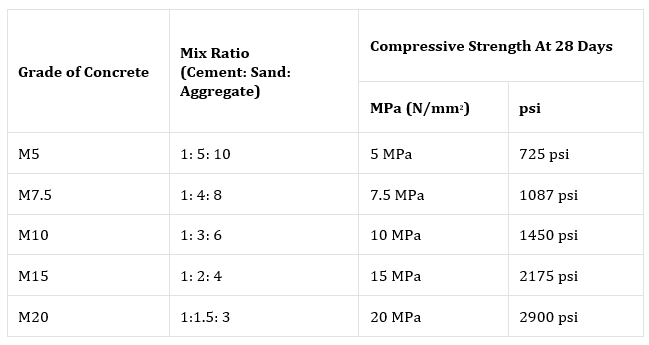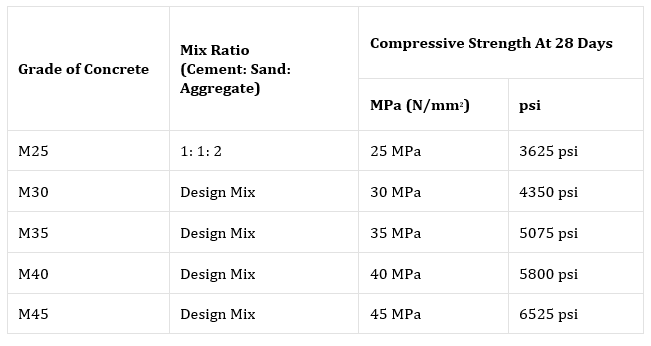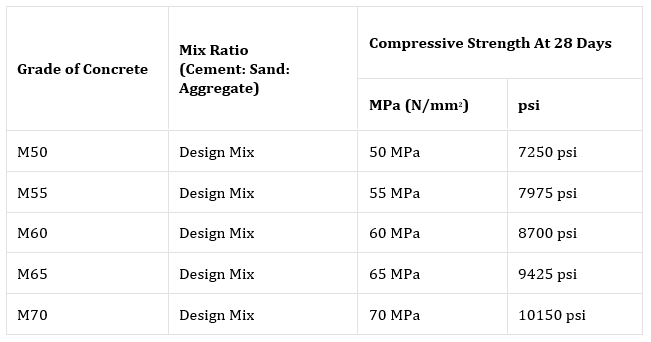What is Grade of Concrete?
Concrete mixes are classified by their grade having specified crushing strength at 28 days as measured in standard conditions with 150 mm × 150 mm × 150 mm size cube, which means the grade of concrete corresponds to its characteristic compressive strength.
M-20 shows the crushing strength of that cube having size 150 mm at 28 days is 20 N/mm2.

Concrete is graded or designated based on its compressive strength. In accordance IS 456:2000, it is graded into fifteen types as given in the table
| Group | Designation | Characteristic Compressive Strength Fck at 28 days (N/mm2) |
| Ordinary Concrete | M 10 M 15 M 20 | 10 15 20 |
| Standard Concrete | M 25 M 30 M 35 M 40 M 45 M 50 M 55 | 25 30 35 40 45 50 55 |
| High strength Concrete | M 60 M 65 M 70 M 75 M 80 | 60 65 70 75 80 |
Grades of concrete are indicated by the letter M which means mix and, it is followed by a number that is the compressive strength of that concrete at 28days in N/mm2.
Concrete Mix Ratio
The concrete mix ratio is the proportion of its ingredients like cement, sand, aggregate, and water. These mix ratios are defined based on the type of construction and required strength.
Although the IS Code gives nominal and standard mix ratio for different construction work based on experience and testing.
Type of Concrete Mix
- Nominal Concrete Mix
- Designed Concrete Mix
Nominal Mix
The Nominal concrete mix may be used for concrete of grade M5, M10, M15 and M20. The proportion of its ingredients are given below:
Grade of Concrete | Maximum Quantity of Dry Coarse and Fine Aggregates by Mass per 50 kg of Cement (kg) | Proportion of Fine Aggregates to Coarse Aggregates by Mass | Maximum Quantity of water per 50 kg of Cement (Litres) |
| M 5 M 7.5 M 10 M 15 M 20 | 800 625 480 350 250 | Generally, 1:2 but subject to an upper limit of 1:1.5 and lower limit 1: 2.5 | 60 45 34 32 60 |
The proportion of fine to coarse aggregates should be adjusted from the upper limit to the lower limit progressively, as the grading of fine aggregates becomes finer and the maximum size of coarse aggregate becomes larger. Graded coarse aggregate should be used.
Designed Concrete Mix
In designed concrete mixes, the proportion of ingredients of concrete are determined to obtain concrete of specified properties with the overall economy. Concrete is graded according to its compressive strength given in the table below:-
Different Types of Concrete Grade With Concrete Mix Ratio and Compressive Strength
Normal Concrete Grades

Standard Concrete Grades

High Strength Concrete Grades

Uses of Different Grades of Concrete
Ordinary grade of Concrete
M 5, M 10, M 15 are used for PCC (Plain cement concrete) work such as Levelling course, bedding for footing, etc.
M 20 is used for RCC ( Reinforced Cement Concrete ) work such as Slab, Beams, Columns ,footing etc (for mild exposure).
Standard Grade Concrete
M 25, M 30, M 35 are used for RCC ( Reinforced Cement Concrete ) like foundations, footings columns, beams, slabs etc.
M-40 grade is used for Pre-stressed concrete work, slabs, beams, columns, footing, etc.
M-45, M-50 grades are used for RCC, Runways, Concrete Roads( POQ ) Prestressed concrete girders, RCC columns, Prestressed beams etc.
M-55 grade is used for Pre-stressed concrete girders and piers etc.
High Strength Concrete
M-60, M-65, M-80 are used for RCC work where high compressive strength is required such as high rise building, long Span bridges, ultra-thin white topping and spillways of dams, coastal construction etc.
